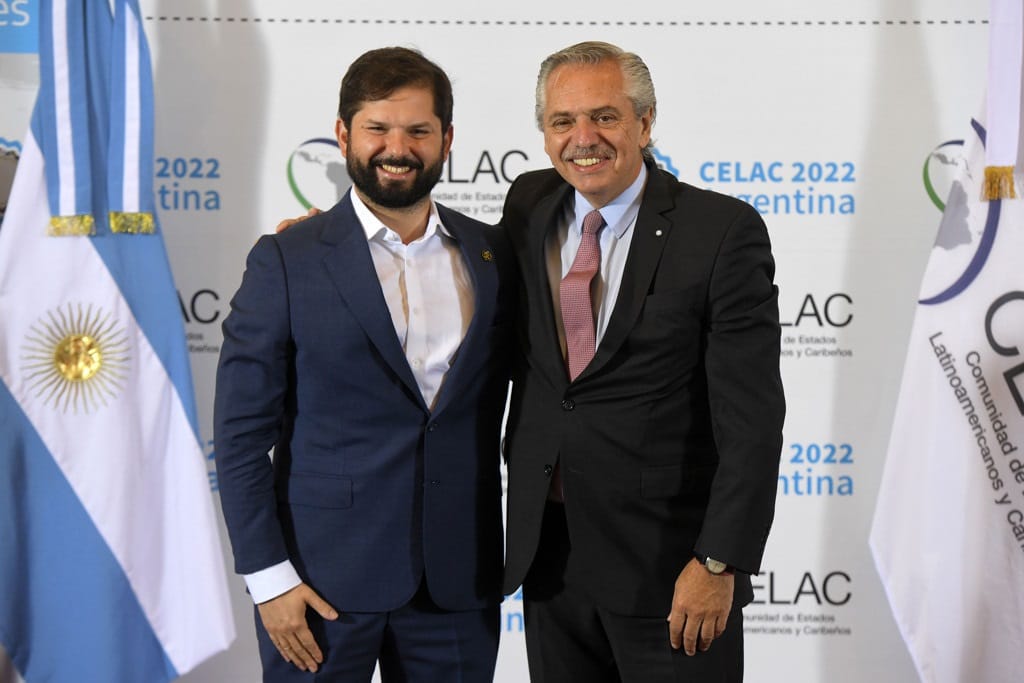The president of Chile, Gabriel Boric, demanded this Tuesday during his speech at the Celac summit the release of “opponents who are still detained in an unworthy manner” in Nicaragua.
The VII Celac summit was inaugurated this Tuesday in the Argentine capital, Buenos Aires. He was invited to the meeting, by the Government of Alberto Fernández, Nicaraguan dictator Daniel Ortega Saavedrabut he did not attend and on his behalf he sent Foreign Minister Denis Moncada Colindres.
Boric premiered this Tuesday in a conclave of the Summit of Latin American and Caribbean States (CELAC)attended by representatives of the 33 countries of Latin America and the Caribbean.
In addition to Boric, about fifteen heads of State and Government are attending the conclave, including Luiz Inácio Lula da Silva, from Brazil; Luis Alberto Arce, from Bolivia; Luis Lacalle Pou, from Uruguay; Gustavo Petro, from Colombia; Miguel Díaz-Canel, from Cuba; and Xiomara Castro, from Honduras.
Since his rise to power a year ago, President Boric has been a strong critic on the indifference of the international community to the crisis of human rights violations in Nicaragua, and has demanded in different international forums the release of the political prisoners of the dictatorship of Ortega and Rosario Murillo.
Last November, during a speech before the Mexican Senate, assured: “We cannot look to the side before the political prisoners in Nicaragua.” In that same session, a group of opposition senators They went to the front of the legislative rostrum and displayed a banner that read: “Boric does not protect murderers in Nicaragua like AMLO,” in reference to Mexican President Andrés Manuel López Obrador.
In an interview with the influential US magazine TIME, boric voiced that “I prefer to be able to tell Daniel Ortega that I disagree with him and I want him to release the political prisoners —(like) Dora María Téllez— say it to his face and confront each other.”
during his speech at the United Nations General Assemblylast September, Boric He called “to carry out the actions that are necessary, and not just statements, and put an end to the abuse of the powerful anywhere in the world, to continue working to contribute to the release of political prisoners in Nicaragua.”
“Respect especially in free elections”
Boric, who since he came to power has harshly criticized the authoritarian regimes in the region and for this reason many analysts consider him a benchmark for the new Latin American left, also referred to the crisis in Venezuela and called for the return of the South American country “to the forums multinationals”.
“The policy of exclusion does not offer authentic or lasting results. This is demonstrated by the history of our Latin America and the Caribbean with the ignominious blockade of the United States to Cuba and more recently to Venezuela”, he pointed out.
Boric, however, called for “free, fair and transparent” elections in Venezuela for 2024 and expressed his government’s desire to “collaborate in the dialogue between the different sectors of the country to find a way out” of the crisis.
“Outside of democracy there is no possible freedom or dignity (…) The dictatorship (in Chile) abruptly taught us through blood and fire the effects of relativizing democracy and human rights,” added the former student leader, who asked to condemn the violations of human rights “regardless of the political persuasion of who governs.”
“Democracy must be respected especially in free elections when the one with whom I disagree wins, and human rights are civilizing advances that must be respected,” he concluded.
Last November, the Chilean president questioned on Twitter the results of the municipal electoral farce of November 6, 2022 with which the Sandinista Front awarded itself the 153 mayors of Nicaragua.
On Sunday municipal elections were held in Nicaragua. Of 153 “disputed” mayoralties, Ortega won 153. An electoral process that is carried out without freedom, reliable electoral justice, and imprisoned or outlawed opponents is not democracy anywhere in the world.
—Gabriel Boric Font (@GabrielBoric) November 9, 2022
“An electoral process that is carried out without freedom, reliable electoral justice and imprisoned or banned opponents is not democracy anywhere in the world,” he wrote on his social network account.
IAPA regrets invitation to “repressive governments”
The Inter-American Press Association (SIP) regretted the presence of President Díaz-Canel, and the foreign ministers of Nicaragua, Moncada Colindres, and Venezuela, Yvan Gil, at the summit. “The three most repressive governments of freedom of the press and expression and journalism in the Americas,” the Miami, Florida-based entity said in a statement.
“If the invitation obeys the objective of promoting dialogue and political agreement on the continent, this required a prior commitment from each member of the regional forum to put an end to repression and the systematic violation of human rights,” says the IAPA statement.
It is, stressed the IAPA, three dictatorships, Cuba, Nicaragua and Venezuela, which “occupy the last three positions of 22 countries in the Chapultepec Index”, a barometer that measures the state of freedom of the press and expression in the Americas.
“We regret that these leaders who violate human rights and disbelieve in democracy have been invited by an organization that, among its objectives, includes the promotion of a respectful dialogue capable of building consensus on issues of common interest,” said the president of the SIP, Michael Greenspon.
The president of the IAPA’s Committee on Freedom of the Press and Information, Carlos Jornet, indicated that the region’s democratic rulers should demand that Nicaragua, Cuba, and Venezuela “put a stop to the repression against journalists, social leaders, and political dissidents.” .














